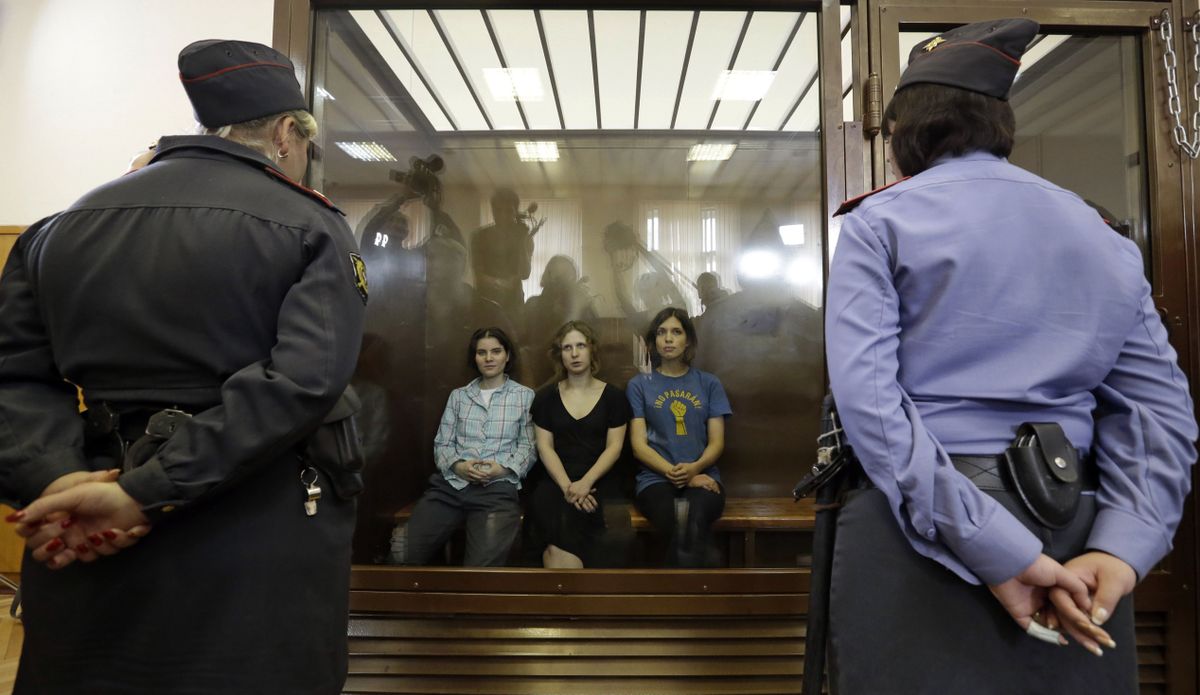Band sentenced to two years
Judge: Russian punk group’s stunt not OK

MOSCOW – Three punk rock-style activists who briefly took over a cathedral in a raucous prayer for deliverance from Vladimir Putin were sentenced to two years in prison for hooliganism on Friday, a decision that drew protests around the world as it highlighted the Russian president’s intensifying crackdown on dissent.
Protesters from Moscow to New York and musicians including Madonna and Paul McCartney condemned the prosecution of the three women, members of a band called Pussy Riot. Several countries, including the U.S., and even some Kremlin loyalists decried the verdict.
Nadezhda Tolokonnikova, 22, Maria Alekhina, 24, and Yekaterina Samutsevich, 30, were arrested in March after performing a “punk prayer” in Christ the Savior Cathedral, dancing and high-kicking as they called on the Virgin Mary to save Russia from Putin, who was elected to a third term as Russia’s president two weeks later.
Judge Marina Syrova ruled Friday that the band members had “committed hooliganism driven by religious hatred.” She rejected the women’s arguments that they were protesting the Russian Orthodox Church’s support for Putin and didn’t intend to offend religious believers.
Putin himself had said the band members shouldn’t be judged too harshly, creating expectations that they could be sentenced to time served and freed in the courtroom. This, however, would have left the impression that Putin had bowed to public pressure, something he has resisted throughout his 12 years in power.
Kremlin spokesman Dmitry Peskov said that Putin couldn’t intervene in the judicial process and refused to comment on the sentence.
When the sentence was announced, shouts of “down with the police state” rose from a crowd of hundreds of Pussy Riot supporters outside the courtroom. More than 50 people were detained, including former world chess champion Garry Kasparov, who said police beat him.
Protesters donned the colorful balaclavas that have become a symbol of the band in many European and U.S. cities, though no single protest outside Moscow drew more than a few hundred people.
In Kiev, Ukraine, four women, one of whom was topless, used a chain saw to cut down a cross. About 40 protesters gathered in New York held up banners that read: “We are all hooligans.”
The crowd in Moscow included many of the prominent writers, journalists and opposition partisans who spearheaded the mass protests that shook the city over the winter and spring. Pussy Riot was an obscure band of activists for much of that time, and some fellow opponents of Putin disapproved of their tactics, but they rallied to the group’s defense after the March arrests.
For three hours as the judge read the verdict, the defendants stood in handcuffs in a glass cage in the courtroom, the same one where oil tycoon Mikhail Khodorkovsky, another Putin opponent, was convicted two years ago.
The three women smiled sadly as the judge recounted testimony of prosecution witnesses accusing them of sacrilege and “devilish dances” in the church and said that their feminist views made them hate the Orthodox religion.